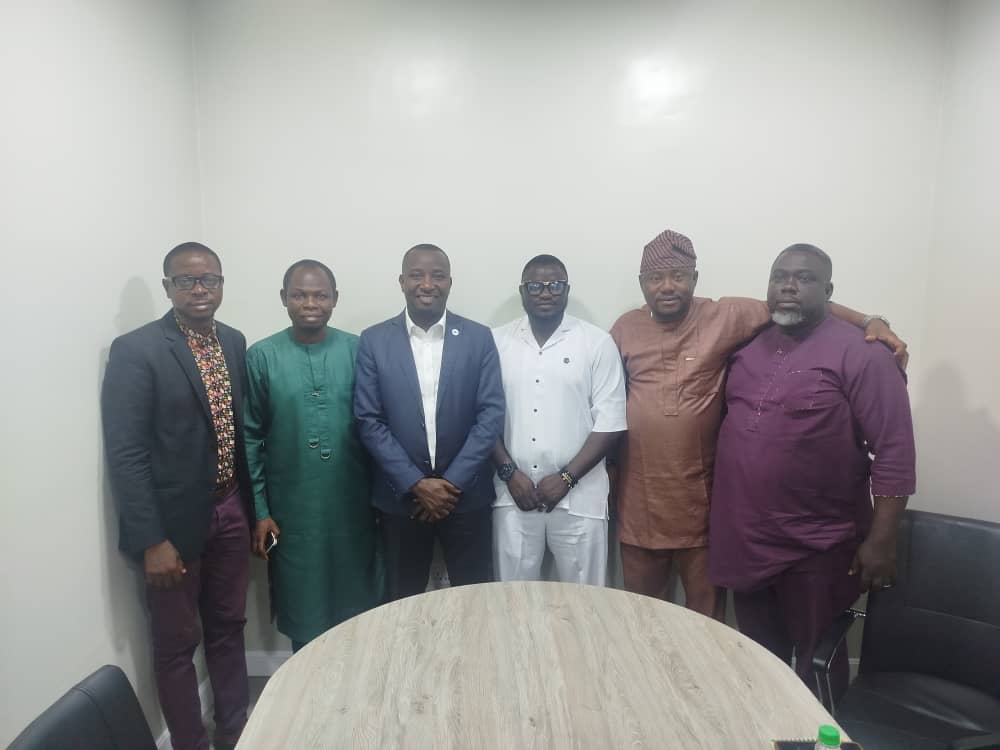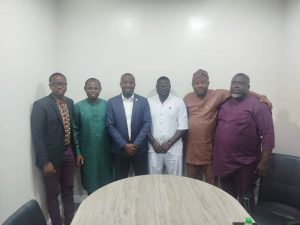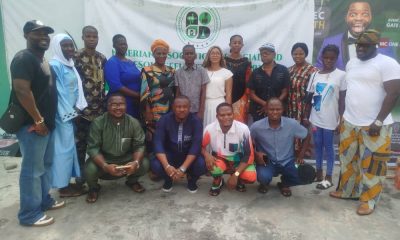Business
Rite Foods Partners NASRE Foundation to Support Ailing Journalists

*Rite Foods Partners NASRE Foundation to Support Ailing Journalists
Rite Foods Limited, a leading indigenous manufacturer in the Food & Beverages sector, has partnered the Noble Association of Social and Resourceful Editors(NASRE) Foundation to provide support for ailing journalists and widows of deceased media practitioners in the country.
This collaboration comes as part of NASRE’s ongoing efforts to assist journalists facing health challenges across the country, having embarked on three outreach programmes last year.
The NASRE team was warmly received on Wednesday, February 5th, 2025, by the management of Rite Foods at its Head Office in Ikeja, Lagos State.
Receiving NASRE team on behalf of the Managing Director of the company, Mr. Saleem Adegunwa, the Head of Corporate Communications and Brand Management , Mr. Ekuma Eze was elated with the visit.
Earlier during the visit, the Public Relations Officer (PRO) of NASRE, Mr. Adeyemi Obadimu had outlined the foundation’s mission and the purpose of the meeting. He revealed the health and financial challenges facing most veteran journalists, who had, during their active years, served the country meritoriously, but are now struggling to survive.
Obadimu highlighted that NASRE’s outreach programme last year was a success, benefiting over 70 individuals, including journalists suffering from partial stroke, widows, and widowers of deceased practitioners . He emphasised the importance of taking care of journalists in need, especially, the veterans who have contributed greatly to the industry.
“Journalism is a thankless job, and as much as we may be appreciated in our bylines, it is crucial that we care for our colleagues who have dedicated their lives to the profession,” said Obadimu.
Butressing his point, the Director, Public Engagement, Mr. Bunmi Obarotimi who represented the President of the association, Mr. Femi Oyewale said: “NASRE’s intends to launch the Foundation officially in this current year and we are proud to have Rite Foods as our partner going forward.”
In his response, Ekuma Eze commended NASRE Foundation for its noble and impactful initiatives, recognising the significant difference it has made in the lives of journalists and their families. He praised the foundation’s efforts in providing assistance to over 70 journalists and their dependents last year. Eze reiterated Rite Foods’ unwavering commitment to supporting initiatives that foster the well-being of the media community.
“At Rite Foods, we are deeply invested in contributing to the development of our society. We understand the importance of health and well-being, especially for those who dedicate their lives to sharing vital information with the public. We believe in the mission of NASRE and are committed to supporting your work in every way possible,” Eze stated.
“This partnership will go beyond just providing financial support; we are dedicated to helping create an ecosystem where journalists can thrive, even in the face of adversity,” he added.
He also spoke about the company’s long-term goals, highlighting Rite Foods’ plan to expand beyond Nigeria and into other African countries. “We have exciting plans for the future,” he added. “Rite Foods is committed to not only strengthening its footprint within Nigeria but also extending our reach to the wider African continent. We believe that our growth will not only benefit our business but also contribute to the national economy, creates job opportunities, and foster the development of the beverage and food sectors.”
Eze emphasised that Rite Foods has been actively involved in national economic development, focusing on reducing unemployment and improving service delivery. As one of the leading manufacturers in the beverage, drinks, and sausages sectors, Rite Foods remains committed to excellence in all its business operations, he said.
Through innovation, quality products, and partnerships like the one with NASRE, the company aims to continue breaking new ground in the industry.
He concluded that, “Our mission at Rite Foods is clear: to improve lives, deliver quality products, and contribute to the economic growth of Nigeria and Africa as a whole. We are proud to partner with organizations like NASRE that share our values of social responsibility and community development.”
The partnership between Rite Foods and NASRE marks a significant step in supporting the health and well-being of journalists, ensuring that those who have dedicated their careers to the industry receive the care and recognition they deserve.
Bank
Alpha Morgan to Host 19th Economic Review Webinar

Alpha Morgan to Host 19th Economic Review Webinar
In an economy shaped by constant shifts, the edge often belongs to those with the right information.
On Wednesday, February 25, 2026, Alpha Morgan Bank will host the 19th edition of its Economic Review Webinar, a high-level thought leadership session designed to equip businesses, investors, and individuals with timely financial and economic insight.
The session, which will hold live on Zoom at 10:00am WAT and will feature economist Bismarck Rewane, who will examine the key signals influencing Nigeria’s economic direction in 2026, including policy trends, market movements, and global developments shaping the local landscape.
With a consistent track record of delivering clarity in uncertain times, the Alpha Morgan Economic Review continues to provide practical context for decision-making in a dynamic environment.
Registration for the 19th Alpha Morgan Economic Review is free and can be completed via https://bit.ly/registeramerseries19
It is a bi-monthly platform that is open to the public and is held virtually.
Visit www.alphamorganbank to know more.
Business
GTBank Launches Quick Airtime Loan at 2.95%

GTBank Launches Quick Airtime Loan at 2.95%
Guaranty Trust Bank Ltd (GTBank), the flagship banking franchise of GTCO Plc, Africa’s leading financial services group, today announced the launch of Quick Airtime Loan, an innovative digital solution that gives customers instant access to airtime when they run out of call credit and have limited funds in their bank accounts, ensuring customers can stay connected when it matters most.
In today’s always-on world, running out of airtime is more than a minor inconvenience. It can mean missed opportunities, disrupted plans, and lost connections, often at the very moment when funds are tight, and options are limited. Quick Airtime Loan was created to solve this problem, offering customers instant access to airtime on credit, directly from their bank. With Quick Airtime Loan, eligible GTBank customers can access from ₦100 and up to ₦10,000 by dialing *737*90#. Available across all major mobile networks in Nigeria, the service will soon expand to include data loans, further strengthening its proposition as a reliable on-demand platform.
For years, the airtime credit market has been dominated by Telcos, where charges for this service are at 15%. GTBank is now changing the narrative by offering a customer-centric, bank-led digital alternative priced at 2.95%. Built on transparency, convenience and affordability, Quick Airtime Loan has the potential to broaden access to airtime, deliver meaningful cost savings for millions of Nigerians, and redefine how financial services show up in everyday life, not just in banking moments.
Commenting on the product launch, Miriam Olusanya, Managing Director of Guaranty Trust Bank Ltd, said: “Quick Airtime Loan reflects GTBank’s continued focus on delivering digital solutions that are relevant, accessible, and built around real customer needs. The solution underscores the power of a connected financial ecosystem, combining GTBank’s digital reach and lending expertise with the capabilities of HabariPay to deliver a smooth, end-to-end experience. By leveraging unique strengths across the Group, we are able to accelerate innovation, strengthen execution, and deliver a more integrated customer experience across all our service channels.”
Importantly, Quick Airtime Loan highlights GTCO’s evolution as a fully diversified financial services group. Leveraging HabariPay’s Squad, the solution reinforces the Group’s ecosystem proposition by bringing together banking, payment technology, and digital channels to deliver intuitive, one-stop experiences for customers.
With this new product launch, Guaranty Trust Bank is extending its legacy of pioneering digital-first solutions that have redefined customer access to financial services across the industry, building on the proven strength of its widely adopted QuickCredit offering and the convenience of the Bank’s iconic *737# USSD Banking platform.
About Guaranty Trust Bank
Guaranty Trust Bank (GTBank) is the flagship banking franchise of GTCO Plc, a leading financial services group with a strong presence across Africa and the United Kingdom. The Bank is widely recognized for its leadership in digital banking, customer experience, and innovative financial solutions that deliver value to individuals, businesses, and communities.
About HabariPay
HabariPay is the payments fintech subsidiary of GTCO Plc, focused on enabling fast, secure, and accessible digital payments for individuals and businesses. By integrating payments and digital technology, HabariPay supports innovative services that make everyday financial interactions simpler and more seamless.
Enquiries:
GTCO
Group Corporate Communication
[email protected]
+234-1-2715227
www.gtcoplc.com
Business
BUA Group, AD Ports Group and MAIR Group Launch Strategic Plan for World-Class Sugar and Agro-Logistics Hub at Khalifa Port

BUA Group, AD Ports Group and MAIR Group Sign MoU to Explore Collaboration in Sugar Refining, Agro-Industrial Development, and Integrated Global Logistics Solutions
Abu Dhabi, UAE – Monday, 16th February 2026
BUA Group, AD Ports Group, and MAIR Group of Abu Dhabi today signed a strategic Memorandum of Understanding (MoU) to explore collaboration in sugar refining, agro-industrial development, and integrated global logistics solutions. The partnership aims to create a world-class platform that strengthens regional food security, supports industrial diversification, and reinforces Abu Dhabi’s position as a hub for trade and manufacturing.
The proposed collaboration will leverage BUA Group’s industrial and logistics expertise, Khalifa Port’s world-class infrastructure, and AD Ports Group’s operational experience. The initiative aligns with the objectives of the UAE Food Security Strategy 2051, which seeks to position the UAE as a global leader in sustainable food production and resilient supply chains. It also aligns with Nigeria’s food production- and export-oriented agricultural transformation agenda, focused on scaling domestic capacity, strengthening value addition, improving post-harvest logistics, and unlocking new markets for Nigerian produce across the Middle East, Asia, and beyond.

Photo Caption: L-R: Kabiru Rabiu, Group Executive Director, BUA Group; Cpt. Mohammed J. Al Shamisi, MD/Group CEO, AD Ports Group; Saif Al Mazrouei, CEO (Ports Cluster) AD Ports Group; Abdul Samad Rabiu, Founder/Executive Chairman, BUA Group; and Steve Green, Group CFO, MAIR Group
Through structured aggregation, processing, storage, and maritime export channels, the partnership is designed to reduce supply chain inefficiencies, enhance traceability and quality standards, and also create a predictable trade corridor between West Africa and the Gulf.
BUA Group—recognised as one of Africa’s largest and most diversified conglomerates, with major investments across sugar refining, food production, flour milling, cement manufacturing, and infrastructure- brings extensive industrial expertise and large-scale operational capability to the venture. MAIR Group will provide strategic support in developing integrated logistics and agro-industrial solutions, creating a seamless platform for production, storage, and distribution.
Abdul Samad Rabiu, Founder and Chairman of BUA Group, said:
“This MoU marks an important milestone in BUA’s international expansion and reflects our long-term vision of building globally competitive industrial platforms. Together with AD Ports Group and MAIR Group, we aim to develop sustainable food production and logistics solutions that strengthen regional supply chains and support the UAE’s Food Security Strategy 2051.”
He further added that, “This partnership represents not just a commercial arrangement but a strategic food corridor anchored on shared economic ambition, resilient infrastructure, and disciplined execution, reinforcing long-term food security objectives for both nations.”
A representative of MAIR Group added:
“This collaboration underscores our commitment to advancing strategic industries in Abu Dhabi and building integrated solutions that reinforce the UAE’s position as a global hub for trade, food security, and industrial excellence.”
A spokesperson from AD Ports Group commented:
“Our partnership with BUA Group and MAIR Group highlights Khalifa Port’s role as a catalyst for high-impact industrial investments. This initiative will enhance regional food security, strengthen global trade connectivity, and support Abu Dhabi’s economic diversification goals.”
This MoU marks a historic collaboration that combines world-class infrastructure, industrial expertise, and strategic vision, setting the stage for a sustainable and resilient food and logistics ecosystem that will benefit the UAE, the region, and global markets alike.
-

 celebrity radar - gossips6 months ago
celebrity radar - gossips6 months agoWhy Babangida’s Hilltop Home Became Nigeria’s Political “Mecca”
-

 society6 months ago
society6 months agoPower is a Loan, Not a Possession: The Sacred Duty of Planting People
-

 news6 months ago
news6 months agoTHE APPOINTMENT OF WASIU AYINDE BY THE FEDERAL GOVERNMENT AS AN AMBASSADOR SOUNDS EMBARRASSING
-

 society5 months ago
society5 months agoReligion: Africa’s Oldest Weapon of Enslavement and the Forgotten Truth









